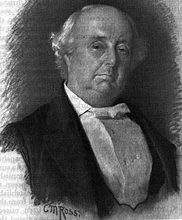



Here I come, my name is Jowett
All there is to know, I know it
What I don't know, is not knowledge
I am the Master of this College*
Benjamin Jowett won an open scholarship in 1835 to Balliol from St Paul's, where the high master, John Sleath, described him as 'the best Latin scholar' whom he had ever sent to the college. He was elected a Fellow of Balliol while still an undergraduate; and, after taking a First in Literae Humaniores and winning the Chancellor's Prize for a Latin Essay, he was appointed a tutor. He became involved in the Oxford Movement and later in the movement for university reform, but he remained a dedicated tutor, a stimulating lecturer and conscientious student of Philosophy and Theology. In 1854 he was a candidate for the mastership of Balliol in succession to Richard Jenkyns, but Robert Scott (1811-87), the lexicographer, was chosen instead.
In 1855, however, in the face of opposition from those who objected to the theological views expressed in his St Paul's Epistles to the Thessalonians, Galatians and Romans (2 vols, 1855), he was appointed Regius Professor of Greek in succession to Thomas Gaisford, though it was not until 1870, when he was fifty-three, that he was elected Master of Balliol.
In the intervening years it was said that he had made time to see every undergraduate in the college once a week, despite the amount of work he undertook; and he had done all he could to ensure that clever young men from poor homes were enabled to attend Balliol and other colleges. As Master he presided over a major building programme at Balliol, which he was determined should produce an Žlite capable of inoculating England. He had, he confessed, 'a general prejudice against all persons who do not succeed in the world'. Having published The Dialogues of Plato in four volumes in 1871, he was elected Vice-Chancellor in 1882.
Jowett energetically encouraged interest in music and the theatre at Oxford, attending performances of the Oxford University Dramatic Society and instituting the Balliol Sunday concerts. He also gave his encouragement to the Oxford University Press. He died at the home of Sir Robert Wright, one of those numerous former pupils to whom he was devoted and who remained deeply attached to him. He was buried in the cemetery of St Sepulchre's. Most of his property was left to the college.
A generous host and, on occasions, a lively conversationalist and anecdotalist, he was prone to bouts of disconcerting silence and to sharp rebuffs. When the President of Corpus Christi said to him, 'Master, I must congratulate you on the appearance of your new volume of Plato. May I send you a few suggestions?' Jowett tersely replied, 'Please don't.' In his autobiography, Augustus Hare wrote that he was 'profoundly grateful to Mr Jowett' but that being 'constantly asked to breakfast alone with him was a terrible ordeal.... Sometimes he never spoke at all, and would only walk round the room looking at me with unperceiving absent eyes as I ate my bread and butter, in a way that, for a very nervous boy, was utterly terrifying. Walking with this kind and silent friend was even worse; he scarcely ever spoke, and if, in my shyness, I said something at one milestone, he would make no response at all till we reached the next, when he would say abruptly, "Your last observation was singularly commonplace."'
* Reference to Benjamin Jowitt, in the Splendid Shilling, undergraduate review of the late 1800s. Thanks to Jason Jowitt and whoever posted it onto Yorksgen!
Copyright S D Jowitt